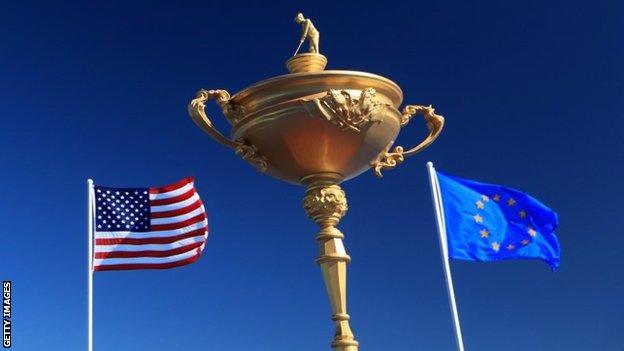Ryder Cup 2020 postponement: 'Fate sealed by players not wanting to play without fans'
- Published
- comments

The last time the Ryder Cup was postponed was in 2001 because of the 11 September terrorist attacks in the US
Uniquely, the Ryder Cup generates vast sums of money but does not pay its players. They are in it for only glory and that lies at the heart of the event's global attraction.
But the biennial match between Europe and the United States can only exist if the leading golfers from those two geographical entities buy into it. Were they to show any indifference, then the sport's most exciting show is fatally diminished.
Northern Ireland's Rory McIlroy, the world number one, was right when he told the BBC: "The players are the ones that make the Ryder Cup. If they are not on board with it and don't want to play then there is no Ryder Cup."
With the likes of American Brooks Koepka adding that he would "possibly" opt out of a match without fans present and his captain Steve Stricker claiming it would be "a crime" if Wisconsin spectators were not allowed in, the fate of this year's match was sealed.
This despite organisers on both sides of the Atlantic being keen to play it from 25-27 September at Whistling Straits. They had television and sponsor agreements to satisfy and these significantly help bankroll the PGA of America and the European Tour.
Throughout the months of debate over whether it should be postponed or not, those sitting on committees and boards with knowledge of the financial implications, spoke in favour of going ahead.
Paul McGinley pointed to other sports making do behind closed doors, while another former European captain, Thomas Bjorn, raised the question over what guarantees exist to allow spectators to be present in 2021.
Current skipper Padraig Harrington ventured that this year's collection of Ryder Cup players "might have to take one for the team" and play the match in the absence of the cheers and roars that make it such an evocative event.
It was clear to me there were two different camps: those who know the financial difficulties of navigating this period without holding an event that is their biggest cash cow, and the players.
These golfers had no interest in generating roars and cheers that would only be heard in living rooms. They need to hear them for themselves - that is what makes the Ryder Cup such an attractive proposition for them.
And it was that view that ultimately held sway. The players are everything and their views are the ones that played the biggest part in the decision to postpone until 2021.
The financial hit for the European Tour this year is not massive, because they make far less money out of away matches. But the circuit now has to cope with a five-year cycle between the home matches that sustain its existence.
Back in May, McIlroy said: "I see it being pushed back until 2021 and, honestly, I think that will be the right call."
He knew then that September 2020 would not involve trying to help Europe defend the Ryder Cup. But it has taken weeks of intense negotiation to make it official.
The trickle-down effect is immense. The situation is vastly different to the late postponement of the 2001 match because of the 11 September attacks in the United States.
By then, the teams had been selected and the infrastructure was in place at the Belfry. Indeed, commemorative merchandise was kept the same and it was known as the 2001 match even though it was ultimately played a year later.
Now the golf calendar is more complex and crowded. The Presidents Cup, played between a US and a Rest of the World team in non-Ryder Cup years, carries greater significance and is run by an increasingly powerful PGA Tour. Golf is also an Olympic sport.
Postponing the Ryder Cup for a year has a profound knock-on for the entire golf schedule at a time of global pandemic and finding ways to satisfactorily mitigate those effects delayed this announcement, even though we all knew it was coming.
Of course, a Ryder Cup without fans would not have been in keeping with the fervent traditions that are the bedrock of the matches in modern times.
It was not always that way. Back in the early days of this event - first contested in 1927 - many a match will have felt like it was being played in isolation, but not any more.
It has grown into one of the world's favourite sporting occasions and the players expect to hear the emotions they stir. That's their payment, if you like.
They are not the paid employees of a football club that might lift the FA Cup at an empty Wembley. These golfers require seeing and hearing the reaction when the Ryder Cup is handed over.
So we will wait another year. Hopefully Bjorn's fears are unfounded, although there is plenty to suggest he makes a worryingly worthwhile point over whether it will be possible to have fans at the match in 2021.
What happens if we remain in a similar state of disarray regarding public health 12 months from now? There are no guarantees.
